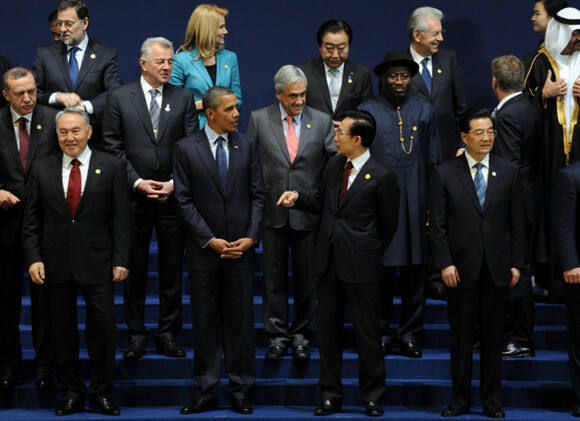hankyoreh
Links to other country sites 다른 나라 사이트 링크
Nuclear Summit communique short of specific targets

By Ahn Chang-hyun and Kim Gyu-won, staff writers
The 2012 Seoul Nuclear Security Summit, which finished with the announcement of the “Seoul Communique” on Tuesday, had at its core an agreement among participating countries to continue decreasing their holdings of nuclear materials, following the “Washington Communique” of 2012. By failing to state specific targets for eliminating or reducing such materials, however, this year’s communique went no further than that agreed upon in Washington.
At the Seoul summit, world leaders sought to limit the risk of nuclear terrorism by getting rid of highly enriched uranium (HEU) and plutonium, the raw materials used to make nuclear weapons. In particular, it encouraged each state to voluntarily set and announce targets for minimizing possession of HEU by the end 2013. The agreement was limited, however, by avoiding the setting of specific targets.
Between the Washington and Seoul summits, 480kg of HEU, enough to make 19 nuclear weapons, was eliminated. In the last two years, the United States and Russia, have lowered the concentration of enough HEU to produce 3,000 nuclear weapons, by converting it into low enriched uranium (LEU). Ukraine and Mexico completely eliminated their stocks of HEU by returning it to, Russia and the US, the states that had supplied it.
The US and Russia are currently deliberating over the disposal of a quantity of plutonium equivalent to 17,000 nuclear weapons in accordance with an agreement made at the Washington summit. Globally, there are 1,600 tons of HEU and 500 tons of plutonium in existence, enough to create 126,000 nuclear weapons.
Nuclear power plant safety, not addressed at the Washington summit, was discussed in Seoul. This change was can be attributed to the nuclear crisis at Fukushima in 2011. It is doubtful, however, that the resulting declaration will have any effect, as it goes no further than a principle-based argument that “…safety measures and security measures have in common the aim of protecting human life and health and the environment… we encourage states to consider establishing appropriate plans for the management of these materials.”
At the summit on Tuesday, Yoshihiko Noda, prime minister of Japan, the country where the Fukushima accident occurred, emphasized that nuclear plant accidents could take place as a result of both natural disasters and of terrorism. Japan, however, is exporting nuclear technology to countries such as Vietnam, even as it closes some of its own nuclear plants and ceases construction of new ones. At the Japanese government briefing on the same day, questions from reporters concentrated on this seemingly contradictory stance. A Japanese government official ducked the questions, saying that the government was cooperating and deliberating with the states involved.
Summit participants also agreed to make joint efforts to enact the Amendment to the Convention on Physical Protection of Nuclear Materials, a convention important for preventing acts of terror against nuclear power facilities, before the next nuclear security summit, which will take place in the Netherlands in 2014. This convention is the only legally binding international document regarding the transfer, trade and protection of nuclear materials. It has yet to obtain the agreement of 97 states, or two thirds of those participating, meaning that only 55 states are party to it and it has yet to come into effect.
The states that took part in the Seoul Nuclear Security Summit from March 26-27 are now expected to submit individual reports by the end of 2013 on their implementation of pledges made at the Washington summit in 2010. One government official said that, while the communique was not binding, many countries would voluntarily submit reports on their implementation of the pledges to the Netherlands, which will chair the next summit in 2014.
Please direct questions or comments to [englishhani@hani.co.kr]
Editorial・opinion
![[Column] Park Geun-hye déjà vu in Yoon Suk-yeol [Column] Park Geun-hye déjà vu in Yoon Suk-yeol](https://flexible.img.hani.co.kr/flexible/normal/500/300/imgdb/original/2024/0424/651713945113788.jpg) [Column] Park Geun-hye déjà vu in Yoon Suk-yeol
[Column] Park Geun-hye déjà vu in Yoon Suk-yeol![[Editorial] New weight of N. Korea’s nuclear threats makes dialogue all the more urgent [Editorial] New weight of N. Korea’s nuclear threats makes dialogue all the more urgent](https://flexible.img.hani.co.kr/flexible/normal/500/300/imgdb/original/2024/0424/7317139454662664.jpg) [Editorial] New weight of N. Korea’s nuclear threats makes dialogue all the more urgent
[Editorial] New weight of N. Korea’s nuclear threats makes dialogue all the more urgent- [Guest essay] The real reason Korea’s new right wants to dub Rhee a founding father
- [Column] ‘Choson’: Is it time we start referring to N. Korea in its own terms?
- [Editorial] Japan’s rewriting of history with Korea has gone too far
- [Column] The president’s questionable capacity for dialogue
- [Column] Are chaebol firms just pizza pies for families to divvy up as they please?
- [Column] Has Korea, too, crossed the Rubicon on China?
- [Correspondent’s column] In Japan’s alliance with US, echoes of its past alliances with UK
- [Editorial] Does Yoon think the Korean public is wrong?
Most viewed articles
- 1‘We must say no’: Seoul defense chief on Korean, USFK involvement in hypothetical Taiwan crisis
- 2Will NewJeans end up collateral damage in internal feud at K-pop juggernaut Hybe?
- 3[Column] Park Geun-hye déjà vu in Yoon Suk-yeol
- 4Why Korea shouldn’t welcome Japan’s newly beefed up defense cooperation with US
- 5Thursday to mark start of resignations by senior doctors amid standoff with government
- 6N. Korean hackers breached 10 defense contractors in South for months, police say
- 7[Guest essay] The real reason Korea’s new right wants to dub Rhee a founding father
- 8[Column] ‘Choson’: Is it time we start referring to N. Korea in its own terms?
- 9Kim Jong-un expressed ‘satisfaction’ with nuclear counterstrike drill directed at South
- 10[Editorial] New weight of N. Korea’s nuclear threats makes dialogue all the more urgent